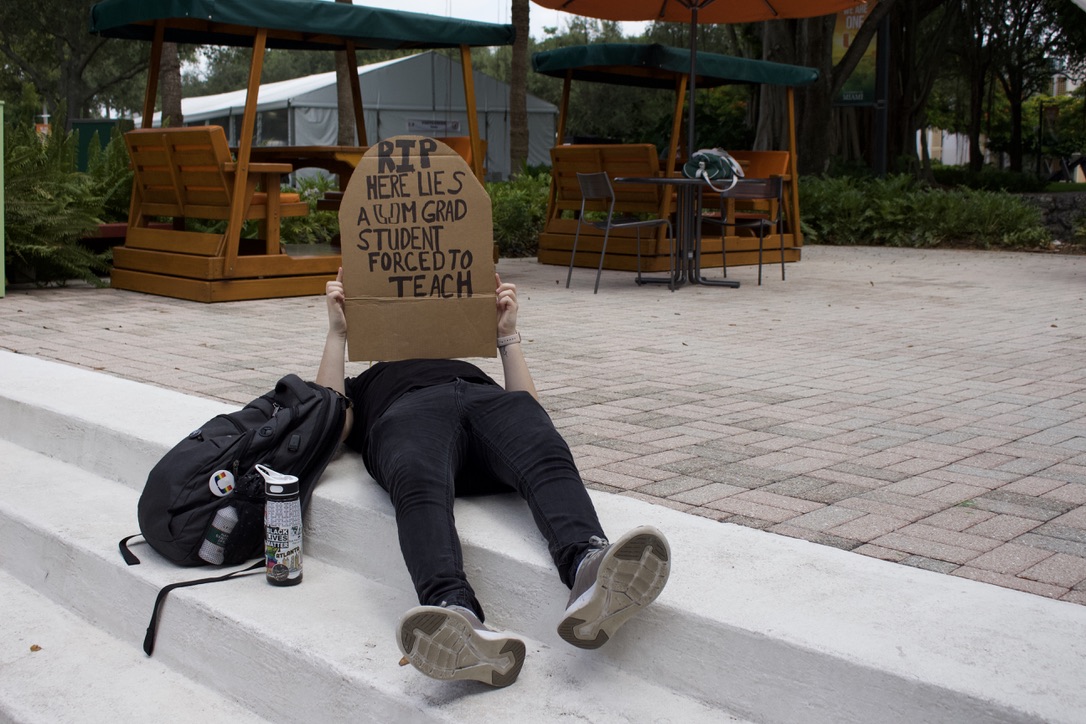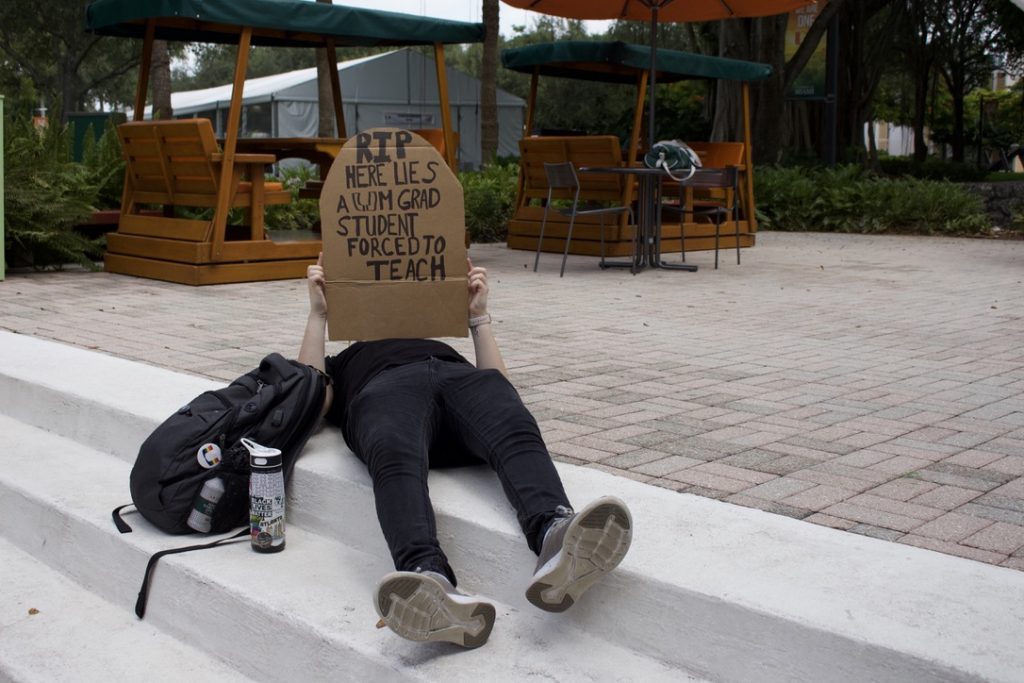

By Naomi Feinstein & Jesse Lieberman
Following a peaceful protest over the University of Miami’s COVID-19 response, a group of participants was emailed and brought into the Dean of Students office without initial explanation, leaving many wondering how they were identified.
“I got scared, my heart started pounding,” said one student who received the email. The individual asked to speak anonymously out of concerns for their own protection. “You think about everything the university could just take away from you in a second.”
Students, faculty and ABM workers— the janitorial and facilities staff at the university— were participating in a “die-in” on Sept. 4, where they protested what they perceive as the university’s failure to acknowledge safety concerns from ABM workers and faculty in the university’s reopening plan. Around three weeks after the protest, nine undergraduate and graduate students who attended received an email requesting that they meet with Associate Vice President for Student Affairs and Dean of Students Ryan Holmes regarding their attendance at the protest.
The email, which was obtained by The Miami Hurricane, was titled “Conversation to discuss UC Rock COVID-19 protest.” Besides a signature and a Zoom link, the email contained only one line: “Dr. Ryan Holmes is inviting you to a scheduled Zoom meeting to discuss an incident that happened on September 4, 2020, at the Whitten University Center.” The email was sent by Nancy Alarcon Del Pozzo, a senior administrative assistant in the Dean of Students office on behalf of Holmes.
Although faculty in various positions attended the protest, only students received the email. All the individuals interviewed who received the email expressed similar initial feelings of anxiousness and then began to ask more questions such as how they were identified.
“I had a mask on— everyone had a mask on, and somehow they ID’d us,” said another protest attendee. “That’s terrifying and an invasion of privacy.”
Prior to the meeting, many of the attendees worried about why they were selected in particular to attend. One of the students, who requested anonymity, called Holmes’ secretary about why she was invited to the meeting, but Del Pazzo would not say, only emphasizing the attendees would not be facing punitive consequences.
“When I asked, like, why I had been chosen specifically, she could not answer that,” said the student. “And when I asked too if perhaps other protesters could join the zoom call, she said ‘absolutely not,’ so that led me to believe that I had been specifically chosen.”
Among the individuals that were initially requested to attend the meeting were three student reporters who were covering the event as media members for The Miami Hurricane and UMTV. The Miami Hurricane photographer who was requested at the meeting did not attend on the advice of their editor.
When UMTV’s faculty advisor Boriana Treadwell was made aware of the request for student reporters to attend the meeting, she requested attendance as well. According to Treadwell, after it was made clear that the reporters were not organizers of the event, she was informed that they did not have to attend the meeting. Neither Treadwell nor the reporters attended.
Although not invited, faculty members who attended the protest soon learned about the meeting after the email was sent out and began to ask similar questions about surveillance and the broader impact on the UM community.
“It left a bad taste in my mouth,” said associate professor Scotney Evans of the email. Although he attended the protest, he was not invited to the meeting. Evans took umbrage with the language in the email that described the protest as an incident. “It was peaceful, it was symbolic. There was nothing inappropriate that we did.”
Holmes explained that the meeting was not meant to be intimidating or discouraging students not to exercise their freedom of expression, rather it was about procedures.
“We wanted to have an educational conversation after the fact, and the educational conversation was based on, ‘Do you understand proper event registration?” Holmes said, who stated the meeting was entirely intended to go over protest procedures. “It’s important for you to understand we’re not talking about content here.”
Under a section titled “Freedom of expression: Demonstration, outside speakers, and political campaign policies,” the UM Student Rights and Responsibilities handbook lays out specific rules for protests and organized demonstrations on campus. The handbook touts UM’s diversity and their support for free expression through media and other outlets and simultaneously states that any students or UM-based organizations must request space for demonstrations through the Dean of Students office. As the handbook explains, if these procedures are not followed, demonstrators may be subject to disciplinary action. There are also several rules governing demonstrations, outlawing firearms, explosives, damaging property or blocking or interfering with campus buildings.
“I can’t recall in my tenure here, which is three and a half years almost now, us ever saying no to any event,” Holmes said in emphasis on why event registration is necessary. “There are things such as security cost or first-come, first-serve on the venue location of choice.”
Holmes reiterated the university would not reject a protest because of content, even if it may be about the administration. It would only be rejected, for instance, if it were to hinder the academic mission of the university or be a public safety issue.
“If somebody’s gonna say, well, we think that administration is not doing something appropriately,” Holmes told The Hurricane, “We’re not gonna step in and say, ‘Well, no, you can’t speak out against the administration.’ There’s no policy violation against that.”
However, the students said they kept emphasizing that they attended the event after seeing it being promoted on social media, disputing the fact that they helped to organize the event. One student said she felt as though because of the cryptic nature of the email, these students, in particular, were being targeted and antagonized.
“I tried to emphasize to Dean Holmes, not once but twice, that we were not organizers of the protest,” said one of the meeting participants. “We were just attendees, so we had no idea that there had been a breach in the paperwork side of things. I tried to really emphasize that maybe we’re not the proper audience for this meeting and that perhaps his message would not reach the right ears, but he did not directly address my concern.”
At the conclusion of the meeting, participants were still left asking the question of how they were identified. Holmes acknowledged asking the University of Miami Police Department for the identification of the students but was not able to provide further information on the identification process.
“When it comes to the inner workings of how it happens… I’m not behind the curtain to see how the sausage is made,” Holmes said.
UMPD police chief David Rivero was invited to an interview with The Miami Hurricane but declined. Rather, he replied to questions provided via email. Some of the rumors surrounding the identification process involved the use of facial recognition software, which Rivero denies UMPD uses or has. When asked to specify how protestors were identified, Rivero provided the following:
“The University of Miami Police Department uses basic investigative techniques to identify people.”
Rivero declined to specify the total number of cameras on campus but acknowledged there are many. He stated they are used for “criminal investigations or disciplinary cases and investigations.” Some of the cameras are monitored 24/7.
“This is kind of what became the sticking point for a lot of us at the meeting,” said one of the protestors who was identified and invited to the meeting. “To me, it seemed like a miscarriage of surveillance on campus.”
All the students interviewed who were identified expressed discomfort with the level of surveillance, as did faculty members who were involved.
“I’m worried about surveillance on campus, the use of cameras, the use of police, as well as the use of surveillance and invasion of privacy in the remote classroom through the use of proctoring software and requiring cameras to be on,” Evans said. “There’s a whole issue of surveillance. Faculty and students need to be aware of the level of surveillance going on around campus— it’s dangerous and disconcerting.”
When asked about the concerns of surveillance, Rivero said UMPD was not concerned and stated: “The campus is an open campus and people are being watched by others all the time, just like you would encounter in any location accessible to the public.”
Others took issue with the feasibility of registering a protest easily considering the current conversation surrounding protests around the country.
“It’s not really a protest if you have to register it. We are in a moment where protests are being deemed illegal. The campus community is a microcosm of what is going on in our state and country,” Evans said. “We need to not give away too many of our rights, especially our rights to free speech.”






